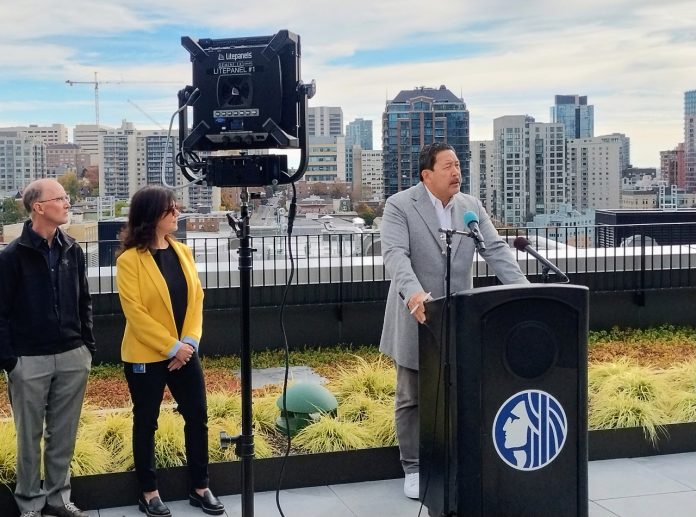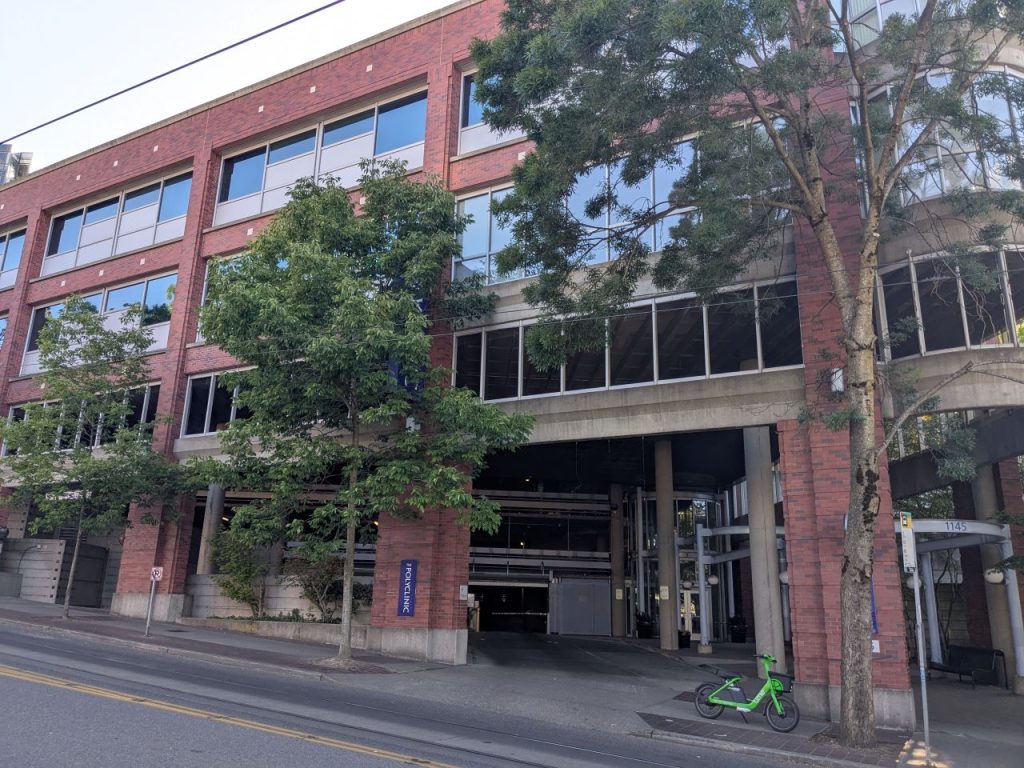
Mayor Bruce Harrell cleared one hurdle standing in the way of King County’s plan to build a crisis care center in Seattle last Thursday as he announced a letter of conditional support outlining his view of an acceptable launch plan. The facility would be located at the former Polyclinic building at 1145 Broadway on the edge of Capitol Hill and would provide behavioral health care for people experiencing a mental health, drug, or alcohol crisis.
Following the county’s selection of that specific site, considerable pushback emerged from nearby business owners wary about concentrating additional human service facilities in their vicinity.
“We will join with you in supporting a new facility in Seattle once it can be opened and operated safely without negative impact on the surrounding community,” Harrell concluded his letter.
Councilmember Alexis Mercedes Rinck has been a strong proponent of the crisis care center, urging the City to approve the site. In early July, she attended a townhall event hosted by Rep. Shaun Scott (D-43rd, Seattle) in support of the site and educating residents about the proposal. A Capitol Hill resident herself, Rinck argued that expanding care infrastructure was the right thing to do, especially in the face of the Trump Administration gutting the social safety net.
“This is a frightening moment in American history,” Rinck said during the townhall. “I don’t know what a Washington without Medicaid looks like. I don’t know what a Seattle looks like with thousands of people that lose their SNAP benefits, and I don’t know what America looks like without any meaningful social safety net. But what I do know is that when the federal government is abandoning their responsibility to take care of people, Seattle and King County is stepping up. We’re going the other direction, because we know our communities are safer when we are all healthy and housed.”

While Rinck’s stance was clear, it wasn’t clear where the mayor stood until last week, when he charted a path to open the facility — albeit with some major hurdles along the way.
Incidentally, a primary election occurred between the townhall and Harrell’s conditional letter of support. Rinck dominated challengers with 78% of the vote, and Harrell struggled to fend off a progressive challenge from Seattle Transit Riders Union leader Katie Wilson, who took a nearly 10-point lead over the incumbent. It’s hard not to read Harrell’s prepared statement as a bit defensive of existing efforts.
“As we continue our work to support those in need, create community safety, and revitalize the health and vitality of this neighborhood and our entire city, ensuring this location is a success will require the comprehensive approach we have advocated for,” Harrell said. “This is an important next step in the City’s public health effort — building on the monumental gains we’ve made through the CARE Department’s behavioral health alternative response, SFD’s Health 99 team, and record investments in substance use treatment and post-overdose care.”
Seattle’s civilianized Community Assisted Response and Engagement (CARE) department expanded in 2024, but it remains capped at 24 responders and locked into a dual responder model, where police must either accompany CARE staff or sign off before they can respond to a call alone. These conditions are due to terms in the police contract that Harrell negotiated with the Seattle Police Officers Guild (SPOG). As a result of these limitations, the vast majority of emergency calls continue to go to SPD rather than CARE.
King County voters approved the Crisis Care Centers Initiative in 2023 to create five centers across the region “where anyone can walk in for behavioral health and substance use care.” Siting the crisis centers is no easy political task. The County’s first center opened in Kirkland, scaling up an existing Kirkland Connections facility, which lessened the siting battle hurdle. Along with four centers serving specific geographic regions of the county, the plan also includes a specific center for youth experiencing crisis.
“From the start, King County has worked hand-in-hand with communities across the region, including Seattle, to increase access to behavioral health treatment and services,” King County Executive Shannon Braddock said in a statement. “The City of Seattle’s partnership is a strong example of how local governments can come together to make care accessible. By engaging residents, first responders, local organizations, and businesses, we’ve heard loud and clear the urgent need for immediate care. We know treatment works — we just need more of it.”

County officials favor the site since it utilizes an existing clinic building of sufficient size, which could be retrofitted quickly and offers close proximity to hospital emergency departments in First Hill and major transportation corridors. Building a facility from scratch would take longer and zoning policies strictly prescribe where clinic facilities can go.
From receipt of the August 13 letter of support, the King County Council has 30 days to act on the purchase and sale agreement. If approved, the purchase would close by the end of December 2025, with the center expected to open by the end of 2027, the County said — assuming the City’s conditions are met by then.
Officials have pledged that the Crisis Care Centers Initiative website will offer upcoming community engagement opportunities and updates on the project. Executive Braddock expressed intent to move forward, submitting a proposal to the King County Council to open the second Crisis Care Center in the region.
In his letter, Harrell said that the City of Seattle’s support to site a crisis care center at this location is contingent on King County’s commitment to and implementation of four main requirements, intended to avoid “negative impact on the surrounding community.”
- Implement recommendations from a security assessment completed in partnership with the Seattle Police Department.
- Develop ongoing safe operations plan that includes “daily exterior cleaning and removal of trash from both the building’s property and the immediately adjacent sidewalks,” 24/7 private security, and regular communication with neighboring businesses, residents, and community groups.
- Execute a Good Neighbor Agreement with the City before the Crisis Care Center can open.
- Conduct a broad outreach and education effort within a half-mile radius of the site, which must be completed at least 60 days prior to the opening of the Center. Following this outreach, the County must work with a six-person community advisory group that the City will appoint. The City encourages the County to explain its decision and lay out what other sites were considered and how they were ruled out.
The mayor noted that the “requirements are similar to efforts taken by the city and county when DESC successfully opened the STAR Center downtown,” a similar 24/7 behavioral health facility.
“We have heard many of the concerns of residents, small business owners, and health advocates who have questioned the decision to site the center in an area that has seen a rise in illicit drug activity and associated violence, and we are encouraging greater transparency and engagement with the community in the County’s decision-making, including providing the reasoning and record of what other sites were considered and why they were or were not appropriate,” the Mayor wrote.
In its announcement, King County noted it has already taken significant outreach steps: “Over the past four months, King County has held over 40 presentations and community conversations with First Hill and Capitol Hill residents, organizations, businesses, hospitals and first responders.”
The conditions that mayor outlined in full are below:
Seattle Mayor Bruce Harrell, August 13 letter to King County Executive
- “King County and the selected operator will partner with the Seattle Police Department (SPD) to complete an internal and external security assessment based on Crime Prevention Through Environmental Design (CPTED) principles and implement the resulting recommendations to help prevent crime and disorder. The City must review and agree that the recommendations have been successfully implemented.
- King County and the selected operator will implement a strong launch, and ongoing safe operations plan for the building and the surrounding exterior spaces, including public sidewalks and other publicly accessible spaces. This plan should include a definition of roles and responsibilities for building security, provider staff, clients, and visitors. It should include early and consistent activation of the building’s publicly accessible spaces and adjacent public spaces, including parking lots, a schedule of daily exterior cleaning and removal of trash from both the building’s property and the immediately adjacent sidewalks and curb spaces, a cadence for scheduled communications with adjacent businesses, residents, and community groups, and what levels of private security staffing will be provided on a 24-hour, seven days-a-week basis. The City must review and approve this plan before implementation and be given the ability to review the effectiveness of the plan in maintaining a safe and disorder-free area adjacent to the building on a quarterly basis following the opening of the Clinic.
- King County and the provider must enter into a Good Neighbor Agreement with the City that details roles and responsibilities, includes as part of the Agreement the above safety assessment and the launch and ongoing safe operations plan, obligates the provider to meet certain safety and disorder standards to be negotiated with the provider, and provides the name and contact details of a provider staff member who will be the primary contact for community members who have complaints or concerns about safety and disorder issues. The agreement will set forth the protocols and process to proactively manage relationships with the adjacent community, ensuring the safety of everyone in the neighborhood. The City, King County, and the provider must execute this Good Neighbor Agreement before the Crisis Care Center can open.
- King County and the provider shall engage in community outreach and education within a one half mile radius of the building to explain the mission of the Crisis Care Center and detail the safety and disorder measures that will be implemented. City representatives must be invited to participate in this outreach and education effort. Following this outreach and education effort, which must be completed at least 60 days prior to the opening of the Center, the City will appoint a six-person community advisory group to work with King County, the provider, and the City during the first year of the Center’s operation. The advisory group will represent the interests of the surrounding community, work to alleviate safety and disorder concerns, and help the Center to achieve its mission.”
Officials from neighboring hospitals issued statements of support, noting the crisis center fills a gap in care and aids overstretched hospitals.
“This new Crisis Care Center will be a lifeline to our neighborhood and surrounding communities and give people the behavioral health care they need, when they need it,” said Amy Dodgion, Senior Manager of Behavioral Health in Acute Care with Providence Swedish. “This is how we get folks on a path to recovery and help alleviate hospitals that are often stretched thin.”
“As a physician and interim president of Virginia Mason Medical Center, I see the lasting impacts of patients coming to us in crisis,” said David Tupponce, M.D. “We remain committed to providing the highest quality of care to all we serve and we also know there are limits to what we can provide here in the hospital and in our emergency department. The Crisis Care Center will fill a critical gap in our community and ensure support is available to those who need it most.”
While the mayor’s conditional letter of support was the most immediate hurdle for the County to clear to advance a crisis care center in Seattle, meeting all the City’s conditions in time for the planned 2027 opening could be a challenge as well. That work now begins in earnest.
Correction: The initial draft incorrectly identified Rinck as the host of the townhall. Rep. Shaun Scott’s office put on the event. This was corrected at 2:30pm, shortly after publication.
Doug Trumm is publisher of The Urbanist. An Urbanist writer since 2015, he dreams of pedestrian streets, bus lanes, and a mass-timber building spree to end our housing crisis. He graduated from the Evans School of Public Policy and Governance at the University of Washington in 2019. He lives in Seattle's Fremont neighborhood and loves to explore the city by foot and by bike.

